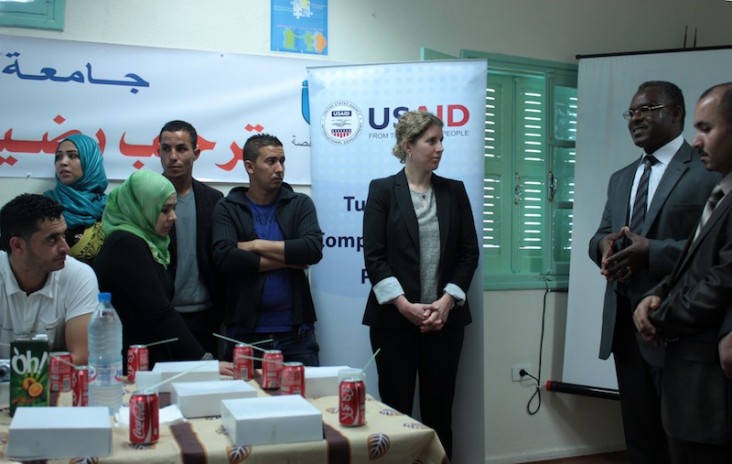
It was still early on a Friday morning at the University of Gafsa, in southwestern Tunisia, but it was easy to spot the newly opened campus career center by a throng of enthusiastic students crowding by its doors. Dozens came to attend the opening ceremony on May 3, 2013, despite hectic end-of-the-year schedules. Within two hours, 70 students had signed in.
“Student participation had previously been one of my concerns,” admitted Makrem Krit, who will head the center’s educational programs. “But after this turnout, I see that it won’t be a challenge.”
The center’s opening was one of six similar USAID-supported launches, including centers at the University of Jendouba in the country’s northwest, the University of Kairouan and the Zaghouan Higher Institue of Technological Studies in the northeast, the University of Sousse on the eastern coast, and Tunis Unviersity in the capital city. The centers were started by USAID in response to the 2011 revolution and the U.S. Government’s commitment to invest in and support Tunisians in addressing high unemployment rates, particularly among women, and boosting economic growth and job creation.
The new centers will help students navigate the uneasy transition into the professional world in post-revolutionary Tunisia. Each center will offer job-searching tips, advice on curriculum planning and networking, coaching on resume writing, and advocacy for students pursuing internships and jobs.
“As someone who works at the university, I strongly believe that part of my job is to help our current students find work,” said Samia Dallagi, who will manage the Gafsa center. “I, myself, once experienced being unemployed for three years, and that was really hard for me.” She is now determined to help students avoid a similar experience.
Gafsa was stage to one of the earliest sparks to the revolutionary movement. In January 2008, members of the local labor union demonstrated to demand equitable employment opportunities. The protest took a violent turn, and the ensuing trial exposed a corrupt judicial system. Several months later, a fruit seller’s self-immolation in Sidi Bouzid, 60 miles away, set off the chain of events now known as the Arab Spring.
As the Tunisian economy adjusts to the revolution’s seismic shocks, however, the country’s interior continues to face development challenges. The unemployment rate in the southwest—28 percent—exceeds that of the country as a whole—13 percent—and hits university graduates and women particularly hard. And fewer large companies are based in Gafsa than along the coast, further limiting options for Gafsa University graduates.
Dellagi sees these trends not as deterrents, but as opportunities to change them, one student at a time. “Just today, many NGOs came to support us and offer help,” she said. “They weren’t formally invited but they heard about our new center and came to express their willingness to help. They said that this was the exact kind of initiative they had been looking for.”
“I hope that the center teaches students to take more initiative in their career search,” said Basma*, 21, who is about to graduate with a diploma in English. The youngest of eight siblings, she dreams of being a Fulbright Scholar and of pursuing a master’s degree. “The center will help us to get into the real professional life,” she added.
“We’re not scared; we’re excited,” said Manal*, another graduating student. “We’re eager for any job—we’re not asking for much.”
*Last name withheld to protect privacy.







Comment
Make a general inquiry or suggest an improvement.